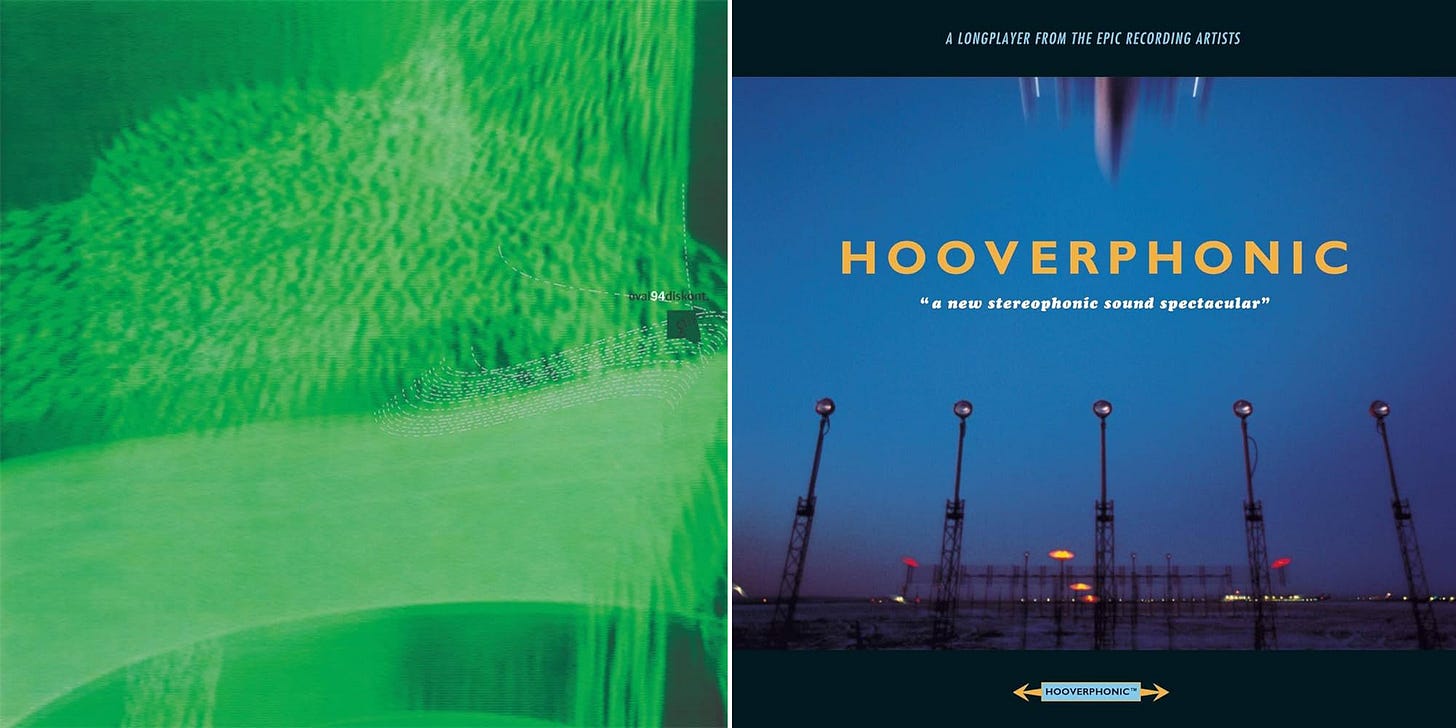The 'Days Between Stations' columns, Interview magazine 1992-2008: The deadly suck of Hooverphonic
July 1997
There's a certain unformed genre of new pop music—drawing on techno, drawing on ambient, indefinable as either—that seems to be about problems without solutions. It's a specter that's raised, perhaps hinted at in lyrics, more often leaking out of an orchestration like bad air. It's a miasma: Without apparent prompting, without narrative or dramatization, you can sense a world where governments have been scaled back into small-time rackets and private intelligence operations, where corporations have replaced communities and advertising stands in for all other forms of public speech, including pop music.
You can hear this—this suspicion, this argument, this suspension of values, whatever it is—in the disassociated arcs and breaks of Oval, one of the more ambitious and intransigent techno outfits, on Systemisch and 94 Diskont (Thrill Jockey). You can hear it most plainly, as an unlifting storm front, on last year's endlessly suggestive compilation Pop Fiction (Quango)—a collection of variations on a would-be soundtrack subtitled “New Crime Jazz" (where it isn't "Crime Jazz" as a genre that feels new, but the unexplained, all-encompassing "Crime" itself). And you can hear it—this dystopian present/future—around the edges of Eighth (Thrill Jockey), the most recent album by Chicago rock 'n' roll trio Eleventh Dream Day, whose gods include Neil Young; you can hear it in the fiercest desires and worries in the background of PJ Harvey's To Bring You My Love (Island). Once you start hearing it, you can hear it almost anywhere, like a language people haven't quite learned how to speak.
By definition, this pop language will be constructed out of secrets the listener is supposed to decode, and a lot of the secrets will be false: jokes planted to make you even more eager to discover what it is that isn't exactly being said—or jokes planted to fool the cops. The great joke of A New Stereophonic Sound Spectacular (Epic), a coolly brilliant record by the Belgian foursome Hooverphonic, is that all the buried hints and warnings turn out to be recycled stereo ads from the late '50s or '60s. And it all adds up.
The band is guitarist Raymond Geerts (also credited with "breaths"), keyboardist-technicians Frank Duchene and Alex Callier, and singer Liesje Sadonius (since replaced by Kyoko Baertsoen—your loss, guys). Sadonius can make her voice sound like a sound effect; she can step out of a piece as the heroine of a French new wave classic, or more likely as someone from the distant margins of the plot, like the woman in Jean-Pierre Melville's 1962 Le Doulos, who appears mainly to take off her blouse and scare the man who was expecting anything but that. In "2Wicky" (which was on the Stealing Beauty soundtrack), Sadonius, or the vaguely disembodied woman she's playing, drifts away from a dubious lover or comrade into threats of vengeance. As always on A New Stereophonic Sound Spectacular, the words she sings are smart and pointed, close enough to those of a million other songs to be absorbed without consciousness, different enough to fester like a virus. Sadonius will start a line as if she's trying out a notion on herself, then dive for it, smearing all pauses: "Before we start you should know you're not the only one who can hurt me. . . You better be sure before you leave me"—then bouncing the next words, as if they're funny—"for another one"—then coming down with just a little more pressure, a tiny shift that makes all the difference—"you can hurt me." Like everything else on the record, this song is so airy, so indistinct, it beckons you to play it again and again, hinting you just might get to the bottom of it; but the more you do, the less it seems to be about lovers at all. The characters begin to seem like stand-ins for the actors in a terrible historical drama, a play in which nobody you care about has the power or the will to accomplish anything more than his or her own death and that of whomever he or she cares about most.
Everything is a dead end escapable only by excursions into fantasies that themselves may have no exits. An ordinary, perfectly pleasing scene-stealing guitar solo by Geerts is sampled by Duchene and Callier and then turned back on the first theme, stopping it cold, stranding the listener. A piece that might seem shaped and finished is extended beyond its obvious ending point, and then everything that's been established is disestablished in a long coda that plays with dissolution—of sounds, words, concepts—like children playing with finger paint, and with as much pleasure.
It's right, then, that the true sting of the strongest number on A New Stereophonic Sound Spectacular turns out to be the cheesiest joke. "Barabas" opens with a harsh, cruel sound repeated constantly, the sound of metal plates scratching against each other; you wait for the sound to modulate, to go somewhere else, but it doesn't. "Living normal life," Sadonius sings over and over, daring you to take this sound as normal life. But around it are a few new features slowly emerging from an unstable, cloudy landscape, and the scratching has taken on strength and momentum. Though it doesn't change, doesn't go anywhere, somehow it carries whoever's listening somewhere else. Everything begins to feel creepily, happily familiar; you realize you're in the middle of a remake of the Beatles' "I Am the Walrus." There's the same rush, the same fall down a rabbit hole, the same certainty of wonders to be revealed at the end of it—except the burbling, indecipherable voices struggling to the surface of the music aren't the gaggle of characters from King Lear you hear at the end of "I Am the Walrus," but just a single voice, now reassembled from the many parts Duchene and Callier had broken it into, announcing that, yes, "Stereophonic is the most natural and satisfying way of listening!"
As if, the music all around the finally clear voice seems to say, you had any choice, in this or anything else.
Originally published in Interview Magazine, July 1997




It's always a great pleasure to read your post!